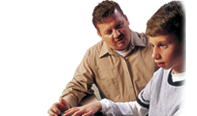|
|||||||||||||||||||
| Primary Activity Coordinators: |
Clinical Services |
||||||||||||||||||
| Discipline Coordinators: |
Psychology |
||||||||||||||||||
| Project/Program/Clinic Contacts: | International Adoption Clinic;
Child Development Clinic; Psychology Clinic |
||||||||||||||||||
| Discipline(s): |
Human Development/Child Development Disability Studies Interdisciplinary Psychology |
||||||||||||||||||
| AUCD Council Membership: |
No Council Membership |
||||||||||||||||||
| Research: | attachment, difficult behaviors, young children | ||||||||||||||||||
| Education: | University of Tennessee, BS
University of Tennessee, MS, Psychology George Peabody College of Vanderbilt University, MS, Psychology George Peabody College of Vanderbilt University, PhD, Developmental Psychology | ||||||||||||||||||
Vita/Bio
Ashford, Linda G.
Assistant Professor
A. Positions and Honors
Positions and Employment
1971 - 1972 Teacher, Covington Elementary School, Covington, TN
1972 - 1973 Teacher, Tate's School of Discovery, Knowxville, TN
1973 - 1975 Instructor, Early Childhood Education at Wilkes Community College, Wilkesboro, NC
1976 - 1978 Lecturer, Early Childhood Education at Murray Park College, Magill, South Australia
1978 - 1981 Research Assistant, George Peabody Coll
ege of Vanderbilt University, Nashville, TN
1978 Infant Research Coordinator, George Peabody
College of Vanderbilt University, Nashville, TN
1982 - 1983 Psychological Examiner, Child Development Center, Department of Pediatrics, Vanderbilt
University Medical Center, Nashville, TN
1984 - 1987 Psychological Examiner, Family and Child
Study Center, Kennedy Center, George Peabody
College of Vanderbilt University, Nashville, TN
1987 - 1993 Coordinator of Psychological Services,
Kennedy Center, George Peabody College of Vanderbilt
University, Nashville, TN
1993 - pres Assistant Professor, Center for Child Development, Department if Pediatrics, Vanderbilt University
Medical Center, Nasvhille, TN
1993 - pres Psychologist, Center for Child Development, Department of Pediatrics, Vanderbilt University
Medical Center, Nashville, TN
1998 - 2001 Adjunt Professor of Psychology, College of
Arts and Sciences, Vanderbilt University, Nashville,
TN
2001 - pres Assistant Professor of Psychology, College or
Arts and Sciences, Vanderbilt University, Nashville,
TN
Other Experience and Professional Memberships
Member, Society for Reserahc in Child Development
Member, Nashville Area Psychological Associaton
Member, Vanderbilt Kennedy Center for Research on Human Development
B. Selected Peer-Reviewed Publications (in chronological order)
Glascoe FP, Byrne KE, Ashford LG, Johnson KL, Chang B, Strickland B. (1992). The accuracy of the Denver II
in developmental screenings.
Pediatrics, 89
, 1221-1225.
Principal Investigator/Program
Director (Last, First, Middle):
Ashford, Linda
PHS 398/2590 (Rev. 09/04, Reissued 4/2006)
Page
8
Continuation Format Page
Stone WL, Lee EB, Ashford LG, Brissie J, Hepburn SL, Coonrod EE, Weiss BH. (1999). Can autism be
diagnosed accurately in children under three years old?
Journal of Child Psychology and Psychiatry, 40
,
219-226.
Ashford LG. (2000). Learning Disability. In J. Law, A. Parkinson, & R. Tamhne, (Eds.).
Communication difficulties
in childhood.
Radcliffe Medical Press: Salisbury, Wiltshire.
Ashford LG. (2001).
Attachment disorders of childhood.
Lifeway Publications.
Lynch A, Ashford LG. (2003).
How can you say that? Turning hurtful words into conversations that heal.
American Girl Press.
C. Research Support
Ongoing Research Support
Craft (PI)
07/01/04 - 06/30/09
US Maternal and Child Health Bureau
Leadership Education in Neurodevelopmental and Related Disabilities (LEND) Project
The Vanderbilt Leadership Education in Neurodevelopmental and Related Disabilities (LEND) program is a
federally funded training program funded through the Depar
tment of Health and Human Services, Maternal and
Child Health Bureau LEND grant. The program focuses on preparing health professionals to assume
leadership roles and develop interdisciplinary team skills, advanced clinical skills, and research skills, in order
to meet the complex needs of children with NDRD.
Role: Core faculty member
Completed Research Support
None






